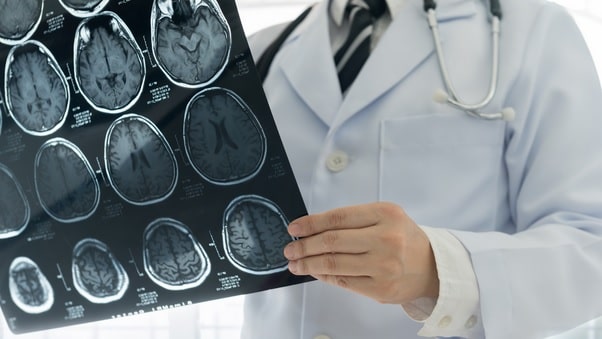Traumatic Brain Injury (TBI) Treatment and Rehabilitation in Tampa, FL

Traumatic brain injuries (TBIs) are a significant concern in Tampa and beyond, affecting countless individuals annually. TBIs can result from various incidents, including motor vehicle accidents, falls, and sports-related injuries, leading to a range of physical, cognitive, and emotional impairments. These head injuries can vary in severity from mild concussions to severe brain damage, each with its own set of challenges. The impact of a TBI on a person’s life is profound, often leading to long-term disability and requiring comprehensive rehabilitation to regain lost functions and improve quality of life.
Understanding and exploring treatment options for TBIs is crucial for effective recovery. At Santos Research Center, a medical research facility dedicated to advancing TBI treatments, we emphasize the importance of tailored rehabilitation plans that address each patient's unique needs. With access to specialized brain injury rehabilitation programs at facilities like Tampa General Hospital (TGH), patients benefit from a multidisciplinary approach involving neurology, physical therapy, occupational therapy, and speech therapy. Comprehensive care, provided by a dedicated team of brain injury rehabilitation specialists, ensures that each aspect of the injury is addressed, fostering a supportive environment for recovery.
Understanding Traumatic Brain Injury
Traumatic brain injury (TBI) is a complex condition that arises from a sudden impact or jolt to the head, leading to disruption in normal brain function. TBIs can range from mild, such as concussions, to severe cases that can result in long-term cognitive and physical impairments. Understanding the different types, causes, symptoms, and diagnostic methods is essential for effective management and treatment. Services can range from outpatient care to intensive inpatient therapy.
Types and Causes
Traumatic brain injuries encompass various types, each with distinct characteristics and levels of severity. Common types of TBIs include:
- Concussions: Most common, usually resulting from a blow to the head or violent shaking or jerking of the body. Symptoms can include headaches, confusion, and dizziness, typically temporary, but two brain injuries or more can lead to long-term complications. Typically takes a few weeks to a few months to recover.
- Contusions: Bruising of the brain tissue, often caused by a direct impact. May result in physical or neurological deficits depending on severity. Recovery may take several months to a year or more.
- Diffuse Axonal Injury (DAI): Results from the brain moving rapidly inside the skull, causing severe bruising and tearing of nerve tissues. It can lead to significant brain damage and long-term disability, with recovery lasting anywhere from months to years.
In Tampa and across the U.S., motor vehicle accidents and falls are the leading causes of severe TBIs, necessitating immediate and specialized medical attention. Other causes include sports injuries, physical assaults, and explosive blasts.
Symptoms
The symptoms of TBI can vary widely based on the injury's severity and the affected brain area. They include:
- Concussion: Headache, confusion, dizziness, ringing in the ears, nausea, fatigue, and temporary loss of consciousness.
- Moderate or Severe TBI: Persistent headache, repeated vomiting, seizures, inability to wake from sleep, dilation of one or both pupils, slurred speech, weakness or numbness in the limbs, loss of coordination, profound confusion, agitation, vision problems, or unusual behavior.
Diagnosis and Treatment
Diagnosing a TBI involves a combination of clinical evaluations and imaging techniques. Understanding the intricacies of traumatic brain injuries, as outlined in the CDC's Traumatic Brain Injury (TBI) Overview, is vital for effective treatment and rehabilitation. A comprehensive approach that includes early diagnosis, specialized care, and tailored rehabilitation plans can significantly improve recovery outcomes for patients suffering from an injury to the brain.

Immediate Treatment
Immediate and appropriate response can profoundly impact recovery outcomes. That's why it's important to take quick action if you suspect a concussion.
Emergency Response
If you witness an accident and an individual has received a blow to the head or a suspected head injury:
- Ensure Safety: Keep the injured person and those around them safe from further harm.
- Call Emergency Services: If unconscious or showing severe symptoms (e.g., bleeding, convulsions), call emergency services immediately.
- Assess Consciousness: Determine if the person is conscious and responsive.
- Provide First Aid: While waiting for help, administer basic first aid:
- Keep them still.
- If possible, stabilize the head and neck in the position you found them.
- Monitor their breathing and pulse, and perform CPR if necessary.
- Apply gentle pressure to any bleeding wounds.
- Do not lift or pick up a child with a head injury, and do not remove any objects sticking out of the wound.
- Keep the person calm, warm, and comfortable.
- Do not offer any food or drink.
Initial Medical Treatment
Emergency responders will stabilize the patient for transportation to the hospital, where the medical team will ensure the patient's airway, breathing, and circulation are stable. They will continuously monitor vital signs such as blood pressure, heart rate, and oxygen levels. After addressing any more immediate concerns, the patient will be sent for imaging, intended to diagnose swelling, skull fractures, and bleeding in the brain. Immediate and effective medical intervention is crucial in minimizing long-term complications and supporting recovery.
Hospitalization and Acute Care
Concussion rarely requires hospitalization, but it is often necessary for a moderate or severe TBI and plays a crucial role in helping patients overcome the challenges associated with rehabilitative care after head trauma. This phase focuses on managing acute symptoms and laying the foundation for recovery.
Critical Care
Hospitalization for patients suffering from traumatic brain injury (TBI) often begins with the intensive care unit (ICU), where specialized medical interventions are crucial for managing acute symptoms and preventing further complications. They will continuously monitor the pressure inside the skull to manage brain swelling and prevent secondary damage. In more severe cases, surgery may be necessary to relieve pressure and repair damage if intracranial pressure is significant or worsening. Treatment may include diuretics to reduce brain swelling, anticonvulsants to prevent seizures, and pain management drugs to alleviate discomfort.
Rehabilitation Planning
Early rehabilitation planning is important for optimizing long-term outcomes for TBI patients, even during the acute care phase.
- Multidisciplinary Approach: A treatment team of specialists, including neurologists, physiatrists, physical therapists, and occupational therapists, collaborates to assess the patient's functional abilities and develop a tailored rehabilitation plan.
- Initial Assessments: Neurological assessments, functional evaluations, and imaging studies conducted during hospitalization guide the development of rehabilitation goals.
- Family Involvement: Educating the patient's family to provide support and continued care post-hospitalization.
- Setting Rehabilitation Goals: Setting achievable short-term and long-term goals to promote recovery and independence in daily activities.
By initiating rehabilitation planning early in the hospitalization phase, healthcare providers aim to maximize the patient's potential for recovery and improve overall quality of life following a traumatic brain injury.
Consult with healthcare professionals specializing in brain injury rehabilitation for more detailed information on hospitalization and acute care for TBI patients.
Rehabilitation Therapies
Effective rehabilitation therapies are pivotal in the recovery journey and require an interdisciplinary, patient-centered approach. These therapies are tailored to offer support through every stage of recovery, aiming to restore functionality and improve quality of life.
This phase begins with a multidisciplinary assessment involving rehabilitation specialists such as neurologists, physiatrists, and social workers to determine the extent of the injury. Treatment Planning may involve therapies such as physical therapy, occupational therapy, speech and language therapy, and or more. It will require a multidisciplinary team using evidence-based therapies tailored to the unique needs of each patient to provide the highest quality of care.
Physical Therapy
Physical therapy interventions are essential for restoring mobility, strength, and coordination, managing pain, and preventing secondary complications like muscle atrophy and balance issues. By addressing physical and cognitive impairments, physical therapy helps patients regain independence and improve their overall quality of life. Additionally, personalized rehabilitation plans support emotional well-being and boost confidence during recovery. They can also address vocational skills to help prepare patients to return to work safely post-injury.
Occupational Therapy
Occupational therapy is essential after a TBI because it helps individuals regain independence in activities of daily living (ADLs), improve cognitive and physical functions, and manage emotional and behavioral changes. Therapists provide tailored rehabilitation that includes relearning daily tasks, enhancing motor skills, and developing coping strategies for sensory and cognitive challenges. This comprehensive approach supports recovery and improves the overall quality of life for TBI patients.
Speech and Language Therapy
Swelling in the brain can temporarily or permanently alter the patient's ability to speak or swallow. Speech therapists focus on improving or recovering speech after a traumatic brain injury and strategies to improve swallowing function and prevent complications.
Rehabilitative therapies help individuals regain independence and achieve their highest potential in daily life by addressing physical, cognitive, and speech difficulties.

Psychological Support
Psychological support, including counseling, psychiatric care, and neuropsychology, is essential for individuals recovering from traumatic brain injuries (TBIs). These services help patients and families manage the emotional and behavioral challenges of severe injuries.
TBIs can cause anxiety, depression, and personality changes due to the physical impact on the brain. Counseling provides a supportive environment for patients to express feelings and learn coping strategies.
Mental health counselors and neuropsychologists address cognitive impairments and emotional well-being. Neurofeedback helps regulate brain activity and enhance cognitive functioning.
Psychiatric care tackles severe mental health issues like PTSD and mood disorders. Psychiatrists and neuropsychologists offer evaluations and treatment plans tailored to TBI patients' needs.
Integrating these psychological supports into a brain injury rehabilitation program enhances recovery and quality of life.
Medications and Medical Management for TBI
Managing medications and ongoing medical care is crucial for treating traumatic brain injuries (TBIs) and ensuring effective symptom management and long-term recovery.
Medications
Medications play a vital role in TBI treatment by addressing pain, preventing seizures, and managing secondary complications:
- Pain Relievers: NSAIDs and acetaminophen manage headaches and other pain.
- Anti-Seizure Drugs: Phenytoin and levetiracetam prevent post-TBI seizures.
- Medications for Secondary Complications: Diuretics reduce brain swelling, and antidepressants or anti-anxiety medications manage emotional and behavioral changes.
Ongoing Medical Care
Regular follow-up visits are essential for monitoring progress and adjusting treatment plans:
- Monitoring Recovery: Assess cognitive function, physical abilities, and emotional well-being.
- Adjusting Treatment Plans: Modify medication dosages, recommend additional therapies, and address new symptoms.
- Educational Support: Provide guidance to patients and families on managing ongoing challenges and adapting to changes post-TBI.
Prioritizing medications and ongoing medical care optimizes outcomes and supports patients throughout their recovery journey from traumatic brain injuries.
Lifestyle Adjustments and Support for TBI Recovery
Adjusting to life after a traumatic brain injury (TBI) often requires home modifications, strong support systems, and educational resources for patients and caregivers.
Home Modifications
Enhancing safety and comfort at home:
- Reduce Hazards: Remove rugs, clear pathways, and install grab bars and handrails.
- Adapt Kitchen and Bathroom: Use non-slip mats, adjustable height surfaces, and assistive devices.
- Create a Quiet Space: Minimize noise and distractions to support concentration and reduce sensory overload.
Support Systems
A patient's non-medical support system is an important part of their rehabilitation team. Family and friends can help encourage open communication and understanding about their condition and progress. Support Groups, both local and online, can be invaluable spaces to share experiences and find emotional support. Professional support through counseling services and social workers specializing in TBI are also integral.
Patient and Caregiver Education
Empowering effective management:
- Resources: Utilize online platforms, community centers, and healthcare providers for educational materials.
- Training Programs: Attend workshops on caregiving skills, symptom management, and rehabilitation techniques.
- Stay Informed: Keep up-to-date on TBI advancements, treatments, and community resources.
These lifestyle adjustments and support systems are crucial for enhancing the quality of life and facilitating recovery for individuals with TBI.
Emerging Treatments and Research
Innovations in TBI treatment continue to evolve with promising therapies and ongoing research opportunities.
Innovative Therapies
Explore emerging treatments that may enhance recovery and quality of life:
- Hyperbaric Oxygen Therapy: Utilizes increased oxygen levels to promote healing and reduce inflammation in the brain.
- Stem Cell Therapy: Investigates the potential of stem cells to repair damaged brain tissue and improve neurological function.
- Virtual Reality Rehabilitation: Uses immersive technology to aid cognitive and motor skills recovery through interactive exercises.
Santos Research Center: Participating in TBI Clinical Trials in Tampa, FL
Santos Research Center offers opportunities for individuals in Tampa, FL, to participate in paid clinical trials focused on traumatic brain injury (TBI). These trials play a crucial role in advancing TBI research by testing new treatments, therapies, and diagnostic techniques. Participants not only contribute to scientific knowledge but also have access to cutting-edge medical care and may receive compensation for their time and participation. If you or a loved one has been affected by TBI and are interested in exploring innovative treatment options, consider joining the Traumatic Brain Injury Paid Clinical Trial at the Santos Research Center, Tampa, FL, location to play a part in shaping the future of TBI care in Tampa.
Conclusion
This guide covers important steps in treating and recovering from traumatic brain injury (TBI). Each stage is vital, from emergency response and hospitalization to rehabilitation therapies and ongoing medical care. Adapting to life after TBI involves lifestyle changes, strong support systems, and educational resources.
If you or someone you know is affected by TBI, explore treatment options tailored to your needs and seek advice from healthcare providers who specialize in brain injuries. For those interested in contributing to research and trying new treatments, contact Santos Research Center at (813) 249-9100 to learn about participating in TBI clinical trials in Tampa, FL. Your participation can help advance TBI research and improve outcomes for many people.
